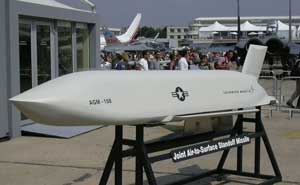The Joint Air-to-Surface
Standoff Missile (JASSM), developed by Lockheed Martin has
been certified by both the JASSM Joint Program Office and
the B-52 Systems Program Office to meet warfighter
requirements and is now ready for operational use. This
major milestone represents a dramatically increased
capability for warfighting aircrews.
"JASSM provides the Air Force with
kick-the-door-down capability," according to Gerry
Freisthler, director of the Air Armament Center's Lethal
Strike project office at Eglin Air Force Base, Fla.
"Shrinking force structure,
increasing tasking, improving threats and the need to
conserve precious lives and assets drive a demand for a
standoff, precision strike capability in the conduct of
21st century air operations. JASSM combines several key
attributes not available in other cruise missiles needed
to satisfy these needs: cost effectiveness, accuracy,
flexibility and responsiveness from a tasking perspective
and high survivability."
JASSM brings new capability to the
warfighter: survivability, lethality and long-range
precision strike, at an affordable price. JASSM also
offers unprecedented safety because it is an insensitive
munition. JASSM is a 2,000- pound class weapon with a
dual-mode penetrator and blast fragmentation warhead.
 JASSM
cruises autonomously in adverse weather, day or night,
using a state-of-the-art infrared seeker in addition to
the anti-jam Global Positioning System (GPS) to find a
specific aim point on the target unlike the current
generation of cruise missiles.
JASSM
cruises autonomously in adverse weather, day or night,
using a state-of-the-art infrared seeker in addition to
the anti-jam Global Positioning System (GPS) to find a
specific aim point on the target unlike the current
generation of cruise missiles.
Its stealthy airframe makes it extremely
difficult for enemy defenses to detect and engage. In
addition to the B-52, the missile is planned for
deployment on B-1, B-2, F-16 and F/A-18 aircraft and has a
range greater than 200 miles.
Lockheed Martin recently delivered the
42nd JASSM to the U.S. Air Force B- 52 bomber community at
Barksdale AFB, La., and at Whiteman AFB, Mo. This missile
delivery, along with the supporting personnel training and
technical data to support sustained JASSM operations,
satisfies a Required Assets Available (RAA) prerequisite
for an Air Force combat unit Initial Operational
Capability (IOC).
The U.S. Government requested that 42 of
the first 76 missiles delivered for Lot 1 go to the B-52
bomber community to fill its RAA need by the end of
September 2003. Lockheed Martin fulfilled that request on
September 24, 2003. This delivery marks the successful
completion of a warfighter requirement documented in the
Operational Requirements Document (ORD) and a Lockheed
Martin commitment to the warfighter made more than four
years ago.
"Lockheed Martin clearly
demonstrated its commitment to the warfighter and to the
success of the program by meeting the RAA," said
Randy Bigum, vice president, Strike Weapons at Lockheed
Martin Missiles and Fire Control.
"We accelerated our delivery in
order to support the warfighters' critical need for cruise
missiles. JASSM will likely be employed in the first
strike of the first day of a conflict. Further, the
missile will be employed against selected high-value
heavily defended targets throughout the war. The missile's
remarkable effectiveness reduces the number of weapons
required to destroy a given target set."
Low Rate Initial Production of Lots 1
and 2 began in late 2001 and will continue through 2004. A
Milestone III Full Rate Production decision is planned for
early 2004. The U.S. Air Force expects to procure 3,700
JASSMs over the life of the program, while the U.S. Navy's
initial procurement of 453 JASSMs starts in FY 2007.
JASSM is produced at Lockheed Martin's
all up round facility in Troy, Ala.
"Our production crews have been
building JASSMs in Troy since late 1999 and have been
extremely successful in getting to production rates during
EMD," said Mike Inderhees, JASSM program director at
Lockheed Martin.
"We are very proud of the
commitment we have seen from the entire JASSM team. The 20
JASSM key suppliers, our electronics and seekers
production team in Ocala, Fla., and the Troy production
team, responsible for production of the final assembly,
test, and pack out, all delivered and made RAA commitments
early. When the state-of-the-art facility reaches
full-rate production of JASSM, it will produce
approximately one missile each day and is currently
scheduled to continue producing JASSMs until 2014."